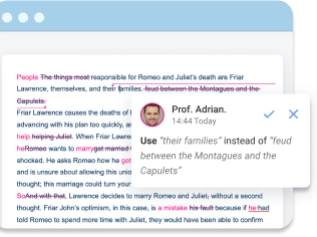Time Management Skills for Success with Simple Steps and Useful Examples
Table of contents
In today’s world, using smart habits and techniques to manage time is more important than ever because life moves fast. We juggle work, school, family, and personal time, often all in one day. Without good organizing skills, it’s easy to feel overwhelmed, fall behind, or miss submission dates. For students seeking help with assignment online, developing strong time management skills can make a big difference.
Time management skills examples include good planning, discipline, and controlling distractions. At the heart of these abilities are simple actions, like setting goals or using a to-do list.
In this article, you’ll see real examples of successful time management skills that show how these habits work in daily life. They help you stay focused, meet deadlines, and feel less stressed. You’ll also learn easy strategies, helpful tips, and ways to form your schedule. With practice, it’ll be easier to accomplish more, feel better in control, and create space for what truly matters.
What Are Time Management Skills?
Along with communication and problem-solving skills, efficient time use is a key professional ability. It is a simple system that lets you plan how to use your daily hours. It means deciding how many hours you’ll spend on each activity ahead of time.
Using your time and efforts wisely helps you get more done without feeling rushed or overwhelmed. Planning your life well allows you to handle work, studies, and personal tasks more smoothly.
Thus, you remain organized and focused. You complete assignments right on schedule, avoid overflow, and give attention to what’s most significant.
In career development, understanding “What is time management skills?” enables you to become trustworthy and efficient. Hiring managers look for people who can handle workload within time limits and remain organized on various tasks.
- A recent meta-analysis found that efficient workload planning moderately affects job performance and overall well-being. So, it allows you to do better at work and feel better personally.
- In workplace surveys, 91% of employees say good organizational habits reduce stress, and 90% believe they increase productivity.
These stats show that applying effective techniques isn’t just about being organized. It also boosts your chances of succeeding at work or school. When you stay on top of your daily tasks, you feel more confident and stay on top of things.
So, in the long run, this can lead to better job performance, stronger results, and even new opportunities. Plus, it helps reduce stress and prevent burnout. In short, good habits not only help you get things done. They also improve your mental health and support your career growth.
Why Time Management Skills Matter?
- 📌 Great Productivity
Managing time effectively enables you to accomplish assignments more productively. If you understand how to plan your schedule and concentrate on the most significant tasks, you do more in less time.
Specific tools like a to-do list, calendar, or time blocking app allow you to organize tasks and track progress. You waste less time deciding what to do next and spend more hours actually working. This is where critical thinking strategies also help; you can easily judge what needs immediate attention.
- 📌 Better Health and Lower Stress
Poor time management often leads to missed deadlines, last-minute rushes, and high anxiety levels. Still, you eliminate this pressure when applying time management techniques like scheduling, prioritizing, and outlining objectives.
A well-thought-out daily schedule helps you manage urgent and important tasks without panic. You’ll have more free hours for personal activities, which improves your mental health. Understanding how long multiple things require and setting limits allows us to reduce burnout.
- 📌 Stronger Work-Life Balance
Good time management skills enhance the ability to combine your job with your personal life. You don’t have to stay late or bring projects home when you effectively manage activities during your working hours.
This leads to a healthier daily routine, like spending weekends with friends or family, exercising, or just relaxing. A solid time management strategy also leaves space for healthy habits and self-care. The ability to complete tasks during scheduled time means more time for yourself.
- 📌 Career Prospects
Hiring managers look for candidates who can manage time effectively. This ability indicates you are reliable, self-motivated, and trustworthy. You stand out in any job search if you can handle specific tasks within time limits and work well under pressure.
These skills are also key project management and communication skills. Do you lead a team or work on your own? Successful planning allows you to handle challenging tasks and get results. Extensive time management experience can ultimately lead to career development and new job opportunities.
Top 10 Key Time Management Skills with Examples
Strong time management skills help you be organized, reduce stress, and use your working hours more productively. No matter what you’re doing, these qualities can boost your performance and allow you to handle tasks on time. Below are ten ways to prioritize tasks, stay concentrated, and handle personal and professional responsibilities.
Prioritization
Knowing which activity to start with can save you a lot of time. Prioritization helps you focus on the most urgent tasks first.
Example: Use the ABC method. Label your tasks as A (must-do), B (should-do), or C (nice-to-do). For instance, finishing a client report due tomorrow is an A. Responding to a non-urgent email might be a C. This time management technique helps you focus your energy where it matters most.
Goal Setting
Clear goals give your day structure. When you understand what you want to get, staying on track is easier.
Example: Use SMART goals – specific, measurable, attainable, relevant, and time-bound. Instead of writing “study today,” it’s better to say “study biology from 10 to 11 AM.” Applying these time management methods keeps your focus on crucial duties and makes your progress easy to track. Good time management skills start with clear and meaningful goals.
Scheduling
A well-planned schedule helps you allocate time to each task so you don’t rush at the last minute.
Example: Use a digital calendar or planner. Schedule blocks of time for meetings, personal activities, or focused work. For example, block 9–11 AM for writing and 2–3 PM for phone calls. Scheduling gives you a clear overview of your day and prevents overbooking.
Delegation
You don’t need to do everything yourself. Knowing when to delegate tasks is a valuable skill, especially in teams.
Example: A project manager might ask a team member to handle the research while focusing on planning. Sharing responsibilities lets other people demonstrate their strengths and provides you with possibilities for more significant tasks.
Time Blocking
One of the most effective tips is time blocking. This involves dividing your day into chunks and working on one thing at a time. This reduces multitasking and boosts focus.
Example: Block mornings for deep, focused work and afternoons for lighter tasks. Avoid mixing various things simultaneously. Examples like this can help you stay on track and get more done in fewer hours.
Task Management Tools
Digital tools help you organize your workload, set reminders, keep your to-do list updated, and even plan team building activities more efficiently.
Example: Tools like Trello, Asana, or Todoist enable big projects to be broken down into smaller tasks. You can assign deadlines, control accomplished tasks, and share responsibilities with others. These time management tools make it easier to manage your time and reduce stress.
Avoiding Procrastination
Delaying work only creates more pressure later. Learning how to beat procrastination is one of the most important skills.
Example: Try the Pomodoro Techique: work for 25 minutes, then take a 5-minute break. This helps your brain remain sharp and keeps you moving forward. Use timers or apps to stay on track and complete tasks within deadlines.
Focus and Concentration
Without focus, you’ll waste hours switching between tasks or getting distracted.
Example: Set a timer for a Deep Work session. Turn off notifications and concentrate on one task until it’s completed. These short, intense work blocks help you manage your time better and make real progress.
Organization
A clean space and clear system can save time and improve your mindset.
Example: Organize your digital files by project or topic. Keep your physical desk neat and use folders or bins. This helps you find what you need fast and reduces mental clutter. Being organized is part of effective planning and also supports activities to improve communication skills, especially in team settings.
Stress Management
High stress levels can affect your ability to think clearly and meet deadlines. Managing stress is part of managing time.
Example: Take breaks to walk, stretch, or breathe deeply. Short pauses during the day can reduce anxiety and improve focus. Mental health care allows you to stay motivated and avoid burnout.
By developing these skills, you can handle various tasks more efficiently, meet deadlines, and enjoy more free time. Use these recommendations to improve your daily routine, reduce time wasters, and reach your goals faster.
How to Use Your Time Effectively?
Good time management doesn’t just happen on its own. It needs practice, strong habits, and the right methods. Below are some of the best strategies you can try. These examples show how to improve time management skills and control your day.
Time Audit
Before you make changes, it helps to know where your day is really going. A personal audit shows how long tasks take and reveals what might slow you down. You may notice certain habits or distractions that add up quickly. This simple step builds awareness and enables you to make smarter choices.
Example: Write down everything you do during the day for one full week. Include work tasks, meals, breaks, checking emails, scrolling on your phone – everything. Be honest. At the end of the week, review your list. You might notice you spend two hours daily on social media or that certain tasks take longer than you thought.
This activity shows you how to use your hours more wisely. Once you understand where your day goes, you can start planning more intentionally. Daily audits are one of the best tricks for building productive work habits and smoother routines.
Eisenhower Matrix
This is one of the most effective time management techniques for sorting certain projects by urgency and importance. It helps you focus on what really matters, not just what feels urgent.
Example: Draw four boxes and sort your tasks into these groups:
- Urgent and important: Finish today’s report (do it now).
- Important but not urgent: Plan next week’s project (schedule it).
- Urgent but not important: Respond to emails (delegate it).
- Not urgent or important: Watch YouTube videos (skip it).
This technique teaches you how to effectively prioritize tasks, prevent burnout, and stop reacting to every little thing. It helps you manage your workload more efficiently, especially when juggling several tasks simultaneously.
Pareto Principle (80/20 Rule)
The Pareto Principle is all about working smarter, not harder. It says that 80% of your results often come from just 20% of your efforts.
Example: If you’re in sales, maybe just two clients bring in most of your income. At school, a few study habits may lead to better grades than hours of cramming.
So instead of trying to do everything, focus on several tasks that really matter. This is one of the best time management tips for saving efforts and boosting results. It also enables you to lower anxiety and work with more purpose.
4. Eat That Frog.
This funny phrase means doing your hardest or most important task first thing in the morning. The idea is simple: eating the frog early makes the rest of the day easier.
Example: If writing a report or solving a tough problem feels hard, start your day with that. Don’t open emails or social media first. Finish the tough task while your mind is fresh.
This method builds discipline and momentum. It also prevents you from putting off difficult tasks until the last minute. Strong personal workload planning abilities often start with doing what you want to avoid the most.
Final Tip: Make These Strategies a Daily Habit
These techniques work best when you use them regularly. Don’t just try one and forget it. Mix and match them depending on your tasks, hours, and energy.
For example:
- Run a monthly check-in to track your habits and keep things under control.
- Apply the Eisenhower Matrix to your weekly to-do list.
- Follow the 80/20 Rule to stay focused on important tasks.
- Start your day by eating the frog and getting it done.
In the long run, these time management examples allow you to enjoy more efficient planning, reduce procrastination, and feel more confident in your daily routine. You’ll be able to perform urgent and important tasks without stress, accomplish your duties more easily, and work with greater focus.
These are not just helpful for work or school. They support personal activities, goal setting, project management, and even job search success. Great scheduling abilities can ultimately lead to better results and better well-being.
How to Write About Time Management Skills in Your Resume?
Productive work habits are important for almost every job. Employers want people who can plan their activities, meet deadlines, and handle tasks without wasting time. But just saying you have “good time management” isn’t enough. You need to show it with clear examples.
Here are some tips to highlight your organizational skills in your resume:
- Use strong action words. Start your bullet points with verbs like managed, organized, scheduled, delegated, or prioritized. These words show that you take action and control time well.
- Mention tools you’ve used. If you use digital planners, calendars, task apps, or project management tools (like Asana, Trello, or Google Calendar), include them. It shows you know how to manage tasks and save hours.
- Be specific. When writing your time management skills resume section, mention how you used your skills and what results you achieved. Numbers and tools help make it more concrete.
Examples for Your Resume
Good productive work habits show you’re reliable, organized, and ready to handle real-world challenges.
4 Things That Slow You Down at Work
Even when trying your best, it’s easy to fall into bad scheduling habits. These little mistakes can slow you down, make you feel stressed, and make you wonder where the day went. But once you know what to look out for, it’s easier to fix them. Here are some of the most common mistakes and what you can do instead:
🚧 Multitasking
Trying to do several things at once might seem efficient, but it usually isn’t. Your brain has to switch between tasks, which makes everything take longer and leads to more errors. This goes against the basic time management skills definition, which is all about using your hours wisely and staying focused on what matters most.
✅ What to do instead: Focus on one thing before the next. Finish it before moving on. You’ll do better work and feel less scattered.
🚧 No Deadlines
When tasks don’t have a clear deadline, it’s easy to keep putting them off. You might keep telling yourself you’ll get to it “later,” but later never comes.
✅ What to do instead: Set small deadlines, even for simple tasks. It gives you a sense of urgency and helps you stay on track.
🚧 Skipping Breaks
Working straight through the day might sound productive, but it usually backfires. You get tired, your mind wanders, and staying focused is harder.
✅ What to do instead: Take short breaks every hour or so. Even five minutes to stretch, breathe, or step away can help you stay sharp.
🚧 Getting Distracted
Phone pings, emails, and social media can break your flow repeatedly. Even small interruptions make it harder to regain focus.
✅ What to do instead: Silence notifications when you’re working. Reserve a few minutes to check your messages later.
Making small changes can help you build better habits. You’ll feel less stressed and more in control of your day. That’s what smart task management is all about.
Conclusion
Effective task management can make life easier and less stressful. When you manage your workload effectively, you get more done, feel more in control, and enjoy more free time.
This article covered the most effective time management strategies, such as prioritization, goal setting, scheduling, and emotional regulation. You saw real examples and techniques that help you focus, stay organized, and finish your important tasks on time. Tools like Trello or calendars can help you organize tasks, block time, and avoid time wasters.
We also shared tips to avoid poor time management, such as multitasking or missing deadlines. A strong time management strategy will improve your productivity, lower anxiety, and help you make better decisions at work and in daily life.
These skills also show hiring managers that you’re reliable and ready for growth. Start small – track your time, plan, and finish your most important tasks first. Over time, your habits will grow stronger. Use these effective tips now and build a routine that works for you!








